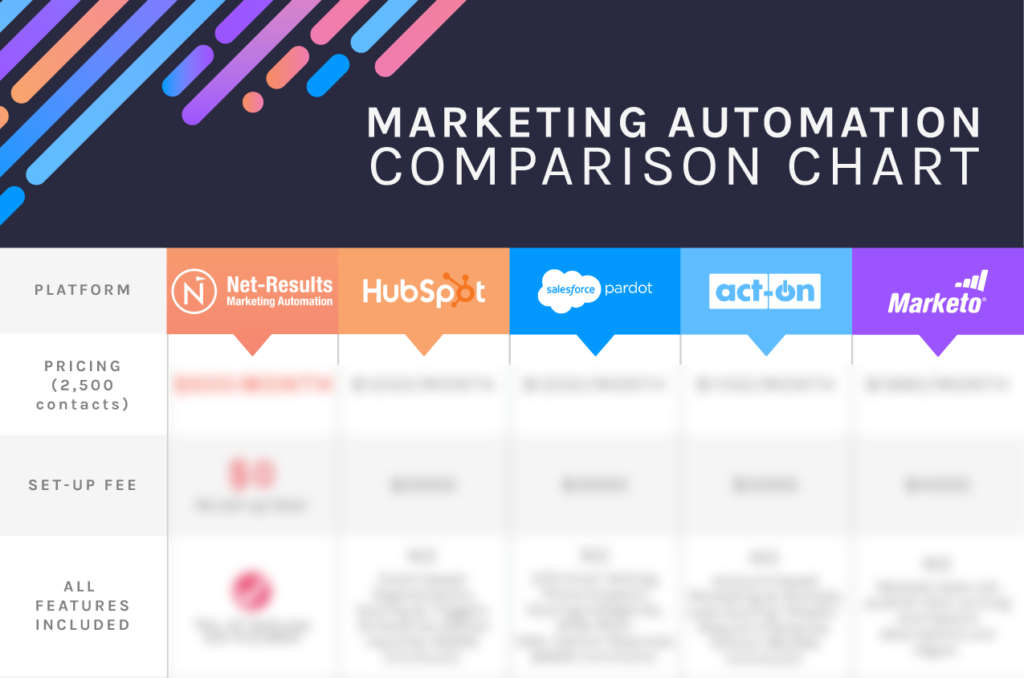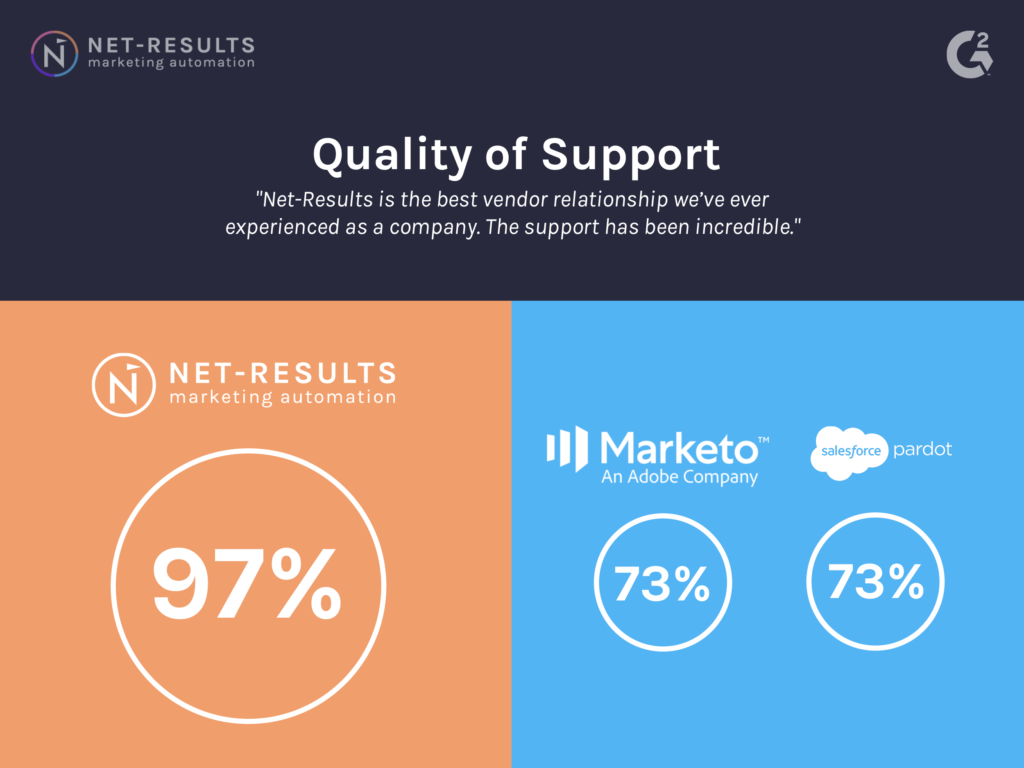Marketing automation has become a necessity for all businesses in the current landscape.
There are many options for a marketing automation platform. One of the most well-known platforms in the industry is Marketo. You are more than likely evaluating Marketo as a potential vendor! We’re Net-Results, and we’re here to walk through some of the best Marketo alternatives in 2021. Yes, we’re a marketing automation platform, but we also want to help marketers (like myself) find the best solution for their organization that will really help drive generate leads and drive revenue.
So, when it comes to marketing automation — what’s most important to your organization? Each link will jump you to the spot in the blog post where you can read about your top interests!
Learn why so many seasoned marketers like you leave Marketo by downloading the free guide; 6 Reasons Marketers Leave Marketo.

1. Price
Time is money, am I right? I figured pricing was a good place to start because there are a lot of competing points of view when it comes to marketing automation pricing.
Obviously, there is the question of “what can my organization afford?” This includes creating a really strong business case and ensuring that marketing automation will really solve all your issues. We actually talk about this in-depth in our Marketing Automation Buyer’s Guide.
Download the Marketing Automation Buyer’s Guide and get the 10 concrete steps to purchasing the right marketing automation platform for your organization. Including how to create a strong business case and making sure your budget for this technology will really garner ROI.
In my eyes, there are two aspects of pricing that we should really be looking at when it comes to marketing automation pricing:
- Base price (what you think you’ll pay)
- Add-ons (what you’ll actually pay)
With Marketo, you can expect to pay for a lot of add-ons because they (like most marketing automation companies) include functionalities in their platform tiers; this means that in order to get some of the functionality that you really need to make marketing automation work for you, you’ll need to go up a tier, even if your database isn’t quite the size that would make that tier a necessity otherwise. Like I said, it’s a common pricing tactic in SaaS business and I’m sure it helps their bottom line enough, but it can definitely be a budget buster for the small and mid-sized businesses of the world!
(It actually goes beyond just things like platform functionality into even more complicated scenarios like being charged per CRM Salesperson Seat or by API calls. It can get very messy, very quickly).
So if pricing is really important to you, I’d suggest going for a company that includes some level of transparent pricing as part of their pricing model. Net-Results happens to be one of those options. Unlike Marketo or HubSpot, which are notorious for their “cost creep” pricing models, Net-Results has a straight-up pricing structure. You pay based on the size of your active database (contacts that are unmailable are not counted towards your database size). That’s it. You get the whole platform, all the features, and full support.
No “reporting add-on” or “sales users” for your CRM integration: pricing… without surprises!
If you’re looking for a full, side-by-side comparison of the pricing of Marketo, Hubspot, Act-On and more, check out the Marketing Automation Comparison Report. It goes really in-depth with what you can expect to pay in those add-ons to your base price and can help determine which platform might really be best for your contact tier.

If price is really important to you, I’d recommend validating your pricing research for your individual business case, because each set of needs is going to make pricing vary wildly (that’s how they get you). You can generally count on the bigger companies to be more expensive (duh), and we’ve found multiple times that our pricing can generally be doubled and that’s a good estimate of how much Marketo will cost.
If you’re looking for a spoiler alert of the pricing row of the Comparison Chart, here’s a rank from least expensive to most expensive.
1. Net-Results Marketing Automation
2. Act-On
Tied for 3. Pardot tied with Hubspot
5. Marketo
2. Platform Functionality
When it comes to marketing automation platform functionality, Marketo might as well be the gold standard for some people. For others? Not so much! Let’s get into why:
Marketo’s platform is going to be highly powerful and also highly specific. It also lacks a level of what we call “technical flexibility,” which essentially boils down to: “how much does the platform change and support changes when I need it?” While Marketo is always updating their platform, the updates are unlikely to be exactly what you need based on a specific piece of feedback.
Marketo vs. Hubspot: We’ve heard from a lot of our customers that they used to be on Hubspot, but as their business grew, the Hubspot platform lacked the depth that the customer really needed for functionality. Especially when compared to HubSpot, the Marketo platform offerings are more complex and robust. That often comes at the price of ease-of-use though, so Hubspot is still a winner in that functionality. Read on for some more good options if you’re looking for both power and ease-of-use.
Marketo vs. Net-Results: Net-Results’ crown jewel is its segmentation capabilities, which are very, very deep (meaning you can be much more granular in the data points you can filter basically any datapoint on). Lead scoring capabilities in Net-Results allow you to score with similar granularity, and it’s easy enough to set up difficult scoring profiles for different personas.
Marketo vs. Pardot: The best part of Pardot is that it has a great Salesforce integration — this doesn’t surprise us of course, because the full name of the platform is literally “Salesforce Pardot.” But it tends to get a bad rap for having less features than Marketo, bad UI (email and landing page builders), and limited features and customization. However, there are a lot of people that really love the platform and swear it’s their favorite!
Marketo vs. Act-On: Act-On has a lot of strengths when compared with Marketo; it’s great for the beginner and intermediate market because it’s easy to learn and more accessible price-wise. However, we’ve also seen a lot of reviews for syncing issues and a bad email composer that can make the day-to-day workflows of a marketing professional difficult to carry out quickly and efficiently. The onboarding period can also be very time-consuming. If you have a good chunk of time to spend to get up and running, this might be a good Marketo alternative for your business.
Marketo vs. Eloqua: I’m going to throw a bonus in here for the users that are really focused on an enterprise level experience. Eloqua is robust and powerful, but tends to be expensive and labor-intensive. It has a reputation for being the kind of technology that essentially requires hiring a consultant to run (difficult to learn, slow). The platform really only makes sense for advanced, large-scale users who have a lot of time, money, and manpower to make use of the complicated platform. Great for some, but definitely not a one-size-fits-all scenario here!
3. Support
This is last on our list but certainly not least. Many first-time users underestimate how important support really is. Waiting to hear back for three days over a simple Campaign question can be the difference between something launching on time or not.
This does tie into pricing in a certain aspect, because it’s one thing to have great support, but it’s a complete other thing to have to pay hundreds, if not thousands of dollars a month for it.
Act-On vs. Marketo: Act-On’s support has a pretty good reputation across their customers. You will pay a multi-thousand dollar set-up fee (hint: $5000+) depending on your scenario, but after that, your support
Pardot vs. Marketo: Pardot, unfortunately, has a reputation for outsourced support that doesn’t live up to expectations. It’s email only and has no available phone support. However, Pardot users have taken this into their own hands and have created the #Pardashians hashtag on Twitter so there is a community of support. However, this doesn’t speak to the quality of the support actually provided by Pardot.
Hubspot vs. Marketo Support: The shining star of the Hubspot support offering is their insanely up-to-date and comprehensive number of resources. Google anything even remotely digital marketing related and an article from Hubspot will come up in your search results — and it will likely be well-written and helpful. Which is a huge plus in their favor! However, their support in other capacities can be lacking. Because their platform
Net-Results vs. Marketo: Here at Net-Results, we have an at your service culture, meaning that our unlimited and dependable Customer Success team is there when you need them. Plus, we have a kick-ass product team that listens and takes action to actually make your life easier. Our customers know that when they need support, our teams have their back because our team is ready with the tools, resources, and support that you need to be successful.
Looking for a more-in depth comparison of factors like Quality of Support, Ease of Setup, Ease of Use, and more? Check out the G2 Marketing Automation Comparison Report, which compares Marketo, Pardot, and Net-Results head-to-head.

Source: Marketing Automation G2 Comparison Report
If you’re looking for the features you want and the support you need at a price you’ll love, look no further than Net-Results. We’re proud to be a fantastic alternative to Marketo.
Till next time,
Sarah from The Net-Results Marketing Team

